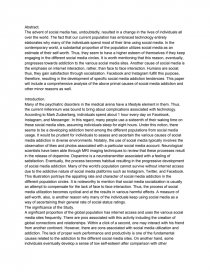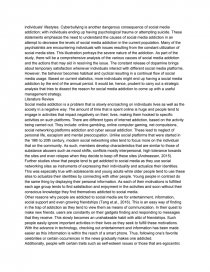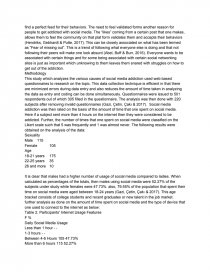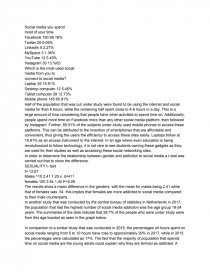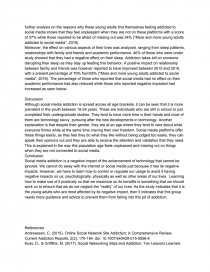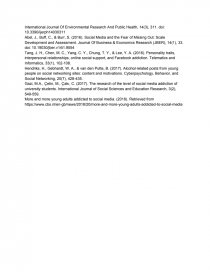Effects of Social Media Addiction
Essay by Mngereza • March 31, 2019 • Research Paper • 2,627 Words (11 Pages) • 2,310 Views
Abstract.
The advent of social media has, undoubtedly, resulted in a change in the lives of individuals all over the world. The fact that our current population has embraced technology entirely elaborates why many of the individuals spend most of their time using social media. In the contemporary world, a substantial proportion of the population utilizes social media as an estimate of their self-worth. Thus, they seem to have a higher esteem of themselves if they keep engaging in the different social media circles. It is worth mentioning that this reason, eventually, progresses towards addiction to the various social media sites. Another cause of social media is the emphasis on internet interaction, rather, than face to face interaction. Humans are social; thus, they gain satisfaction through socialization. Facebook and Instagram fulfill this purpose, therefore, resulting in the development of specific social media addiction tendencies. This paper will include a comprehensive analysis of the above primal causes of social media addiction and other minor reasons as well.
Introduction.
Many of the psychiatric disorders in the medical arena have a lifestyle element in them. Thus, the current millennium was bound to bring about complications associated with technology. According to Mark Zuckerberg, individuals spend about 1 hour every day on Facebook, Instagram, and Messenger. In this regard, many people use a sixteenth of their waking time on these social media sites, assuming individuals sleep for eight hours. Under this notion, there seems to be a developing addiction trend among the different populations from social media usage. It would be prudent for individuals to assess and ascertain the various causes of social media addiction in diverse environments. Notably, the use of social media typically involves the observation of likes and photos associated with a particular social media account. Neurological scientists have been able through MRI imaging techniques to review that these processes result in the release of dopamine. Dopamine is a neurotransmitter associated with a feeling of satisfaction. Eventually, the process becomes habitual resulting in the progressive development of social media addiction. Many of the world's population cannot survive without internet access due to the addictive nature of social media platforms such as Instagram, Twitter, and Facebook. This illustration portrays the appalling rate and character of social media addiction in the different population circles. It is noteworthy to mention that social media socialization is usually an attempt to compensate for the lack of face to face interaction. Thus, the process of social media utilization becomes cyclical and at the results in various harmful effects. A measure of self-worth, also, is another reason why many of the individuals keep using social media as a way of ascertaining their general rate of social status ratings.
The significance of the Study.
A significant proportion of the global population has internet access and uses the various social media sites frequently. There are pros associated with this activity including the creation of global connections and relationships. Within a click of a second, one may interact with his friend from another continent. However, there are cons associated with social media utilization and addiction. The lack of proper work performance and productivity is one of the fundamental causes related to the addiction to the different social media sites. On another hand, some individuals eventually develop a sense of low self-esteem after comparison with other individuals' lifestyles. Cyberbullying is another dangerous consequence of social media addiction; with individuals ending up having psychological trauma or attempting suicide. These statements emphasize the need to understand the causes of social media addiction in an attempt to decrease the levels of social media addiction in the current population. Many of the psychiatrists are encountering individuals with issues resulting from the constant utilization of social media sites. This illustration portrays the severe nature of the addiction. As part of the study, there will be a comprehensive analysis of the various causes of social media addiction and the actions that may aid in resolving the issue. The constant release of dopamine brings about temporary satisfaction whenever individuals interact with different social media platforms. However, the behavior becomes habitual and cyclical resulting in a continual flow of social media usage. Based on current statistics, more individuals might end up having a social media addiction by the end of the annual period. It would be, hence, prudent to carry out a strategic analysis that tries to dissect the reason for social media addiction to come up with a useful management strategy.
Literature Review
Social media addiction is a problem that is slowly encroaching on individuals lives as well as the society in a negative way. The amount of time that is spent online is huge and people tend to engage in activities that impact negatively on their; lives, making them hooked to specific activities on such platforms. There are different types of internet addiction, based on the activity being carried out. They include: online gambling, online computer gaming, net compulsions, social networking platforms addiction and cyber sexual addiction. These lead to neglect of personal life, escapism and mental preoccupation. Unlike social platforms that were started in the 19th to 20th century, modern social networking sites tend to focus more on the individual that on the community. As such, members develop characteristics that are similar to those of substance abusers such as mood shifts, conflicts mostly interpersonal, high tolerance towards the sites and even relapse when they decide to keep off these sites (Andreassen, 2015).
Further studies show that people tend to get addicted to social media as they use social networking sites as instruments of expressing their individuality and actualize their identities. This was especially true with adolescents and young adults while older people tend to use these sites to actualize their identities by connecting with other people. Young people in contrast do the same thing by displaying their personal information. As each of their motivations is fulfilled each age group tends to find satisfaction and enjoyment in the activities and soon without their conscious knowledge they find themselves addicted to social media.
Other reasons why people are addicted to social media are for entertainment, information, social support and even growing friendships (Tang et.al., 2016). This is an easy way of finding in the
...
...
